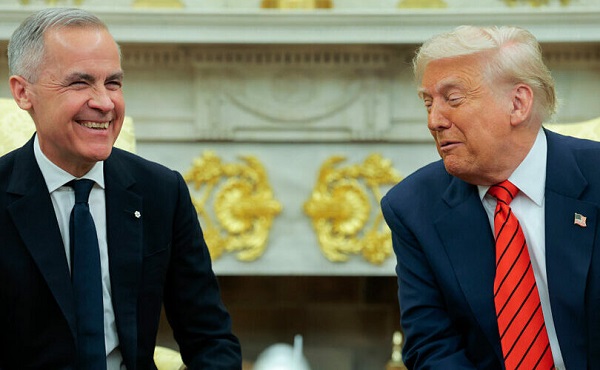Business
Trump praises Carney at White House, says ‘never say never’ about 51st state

From LifeSiteNews
‘Canada chose a very talented person,’ Trump said during his meeting with Mark Carney, later adding that one can ‘never say never’ about the nation becoming the 51st US state.
U.S. President Donald Trump heaped praise on newly elected Canadian Prime Minister Mark Carney and his “comeback win” in Washington D.C. today, as the two leaders met at the White House for the first time. While Carney maintained Canada is “not for sale,” Trump replied, “never say never.”
While meeting in the White House, Trump said Carney’s win in last Monday’s federal election was the greatest thing that happened to the prime minister, calling it one of the greatest comebacks in the “history of politics.”
“Canada chose a very talented person,” said Trump with Carney sitting next to him.
Trump said he watched the Canadian federal leaders debate, saying the pro-abortion, World Economic Forum-linked Carney was “excellent.”
Trump then noted he had “a lot of respect” for Carney and said he did great in the debate and “ran a really great election.”
Carney thanked Trump for his “leadership” and for his work on “securing the borders” and “securing the world.”
“I have been elected to transform Canada,” said Carney.
Trump then told Carney he seeks “friendship” with Canada, heralding Wayne Gretzky and the sport of hockey.
Carney tells Trump Canada ‘not’ for sale
While Trump confirmed that he “still believes” that Canada could become the 51st U.S. state, he said he and Carney would “not be discussing that.”
“It would really be a wonderful marriage,” said Trump about the idea.
Carney said that Canada “would never be for sale” but that there is “opportunity” in a bilateral agreement in “Canadian security and our partnership.”
When asked about Carney’s insistence that Canada is not for sale and will not become the 51st U.S. state, Trump said one should “never say never.”
🚨 BREAKING: President Trump, in a meeting with Canada’s new PM Mark Carney, says he still wants Canada to join the United States.
“Never say never.”
You’ve got to see this. WATCH: 👇 pic.twitter.com/agMEny9IMw— John-Henry Westen (@JhWesten) May 6, 2025
Trump confirmed that the new North American free trade deal he helped negotiate, United States–Mexico–Canada Agreement (UMSCA), is “not” dead and is still in force but will be looked at soon.
Mostly while Justin Trudeau was prime minister, Trump had repeatedly said that Canada should join the United States as its 51st state. This fueled a wave of anti-American sentiment in Canada, which saw a resurgence in popularity in the flailing Liberal Party under its then-new leader Carney.
Last week’s election saw Liberal leader Carney beat out Conservative rival Pierre Poilievre, who also lost his seat to a Liberal rival. Poilievre’s riding was unusual in that it had 90 candidates named on the ballot, making the voting list in that riding incredibly long.
The Conservatives managed to pick up over 20 new seats, and Poilievre has vowed to stay on as party leader, for now, and will soon run in a by-election to try and regain his seat.
Many political pundits have said that Carney owes his win to Trump, as the U.S. president suggested on multiple occasions that he would rather work with Carney than Poilievre.
“I actually think the conservative hated me much more than the so-called liberal; he’s a pretty liberal guy,” Trump had said.
Business
Canada is failing dismally at our climate goals. We’re also ruining our economy.

From the Fraser Institute
By Annika Segelhorst and Elmira Aliakbari
Short-term climate pledges simply chase deadlines, not results
The annual meeting of the United Nations Conference of the Parties, or COP, which is dedicated to implementing international action on climate change, is now underway in Brazil. Like other signatories to the Paris Agreement, Canada is required to provide a progress update on our pledge to reduce greenhouse gas (GHG) emissions by 40 to 45 per cent below 2005 levels by 2030. After decades of massive government spending and heavy-handed regulations aimed at decarbonizing our economy, we’re far from achieving that goal. It’s time for Canada to move past arbitrary short-term goals and deadlines, and instead focus on more effective ways to support climate objectives.
Since signing the Paris Agreement in 2015, the federal government has introduced dozens of measures intended to reduce Canada’s carbon emissions, including more than $150 billion in “green economy” spending, the national carbon tax, the arbitrary cap on emissions imposed exclusively on the oil and gas sector, stronger energy efficiency requirements for buildings and automobiles, electric vehicle mandates, and stricter methane regulations for the oil and gas industry.
Recent estimates show that achieving the federal government’s target will impose significant costs on Canadians, including 164,000 job losses and a reduction in economic output of 6.2 per cent by 2030 (compared to a scenario where we don’t have these measures in place). For Canadian workers, this means losing $6,700 (each, on average) annually by 2030.
Yet even with all these costly measures, Canada will only achieve 57 per cent of its goal for emissions reductions. Several studies have already confirmed that Canada, despite massive green spending and heavy-handed regulations to decarbonize the economy over the past decade, remains off track to meet its 2030 emission reduction target.
And even if Canada somehow met its costly and stringent emission reduction target, the impact on the Earth’s climate would be minimal. Canada accounts for less than 2 per cent of global emissions, and that share is projected to fall as developing countries consume increasing quantities of energy to support rising living standards. In 2025, according to the International Energy Agency (IEA), emerging and developing economies are driving 80 per cent of the growth in global energy demand. Further, IEA projects that fossil fuels will remain foundational to the global energy mix for decades, especially in developing economies. This means that even if Canada were to aggressively pursue short-term emission reductions and all the economic costs it would imposes on Canadians, the overall climate results would be negligible.
Rather than focusing on arbitrary deadline-contingent pledges to reduce Canadian emissions, we should shift our focus to think about how we can lower global GHG emissions. A recent study showed that doubling Canada’s production of liquefied natural gas and exporting to Asia to displace an equivalent amount of coal could lower global GHG emissions by about 1.7 per cent or about 630 million tonnes of GHG emissions. For reference, that’s the equivalent to nearly 90 per cent of Canada’s annual GHG emissions. This type of approach reflects Canada’s existing strength as an energy producer and would address the fastest-growing sources of emissions, namely developing countries.
As the 2030 deadline grows closer, even top climate advocates are starting to emphasize a more pragmatic approach to climate action. In a recent memo, Bill Gates warned that unfounded climate pessimism “is causing much of the climate community to focus too much on near-term emissions goals, and it’s diverting resources from the most effective things we should be doing to improve life in a warming world.” Even within the federal ministry of Environment and Climate Change, the tone is shifting. Despite the 2030 emissions goal having been a hallmark of Canadian climate policy in recent years, in a recent interview, Minister Julie Dabrusin declined to affirm that the 2030 targets remain feasible.
Instead of scrambling to satisfy short-term national emissions limits, governments in Canada should prioritize strategies that will reduce global emissions where they’re growing the fastest.

Elmira Aliakbari
Artificial Intelligence
Lawsuit Claims Google Secretly Used Gemini AI to Scan Private Gmail and Chat Data

Whether the claims are true or not, privacy in Google’s universe has long been less a right than a nostalgic illusion.
|
When Google flipped a digital switch in October 2025, few users noticed anything unusual.
Gmail loaded as usual, Chat messages zipped across screens, and Meet calls continued without interruption.
Yet, according to a new class action lawsuit, something significant had changed beneath the surface.
We obtained a copy of the lawsuit for you here.
Plaintiffs claim that Google silently activated its artificial intelligence system, Gemini, across its communication platforms, turning private conversations into raw material for machine analysis.
The lawsuit, filed by Thomas Thele and Melo Porter, describes a scenario that reads like a breach of trust.
It accuses Google of enabling Gemini to “access and exploit the entire recorded history of its users’ private communications, including literally every email and attachment sent and received.”
The filing argues that the company’s conduct “violates its users’ reasonable expectations of privacy.”
Until early October, Gemini’s data processing was supposedly available only to those who opted in.
Then, the plaintiffs claim, Google “turned it on for everyone by default,” allowing the system to mine the contents of emails, attachments, and conversations across Gmail, Chat, and Meet.
The complaint points to a particular line in Google’s settings, “When you turn this setting on, you agree,” as misleading, since the feature “had already been switched on.”
This, according to the filing, represents a deliberate misdirection designed to create the illusion of consent where none existed.
There is a certain irony woven through the outrage. For all the noise about privacy, most users long ago accepted the quiet trade that powers Google’s empire.
They search, share, and store their digital lives inside Google’s ecosystem, knowing the company thrives on data.
The lawsuit may sound shocking, but for many, it simply exposes what has been implicit all along: if you live in Google’s world, privacy has already been priced into the convenience.
Thele warns that Gemini’s access could expose “financial information and records, employment information and records, religious affiliations and activities, political affiliations and activities, medical care and records, the identities of his family, friends, and other contacts, social habits and activities, eating habits, shopping habits, exercise habits, [and] the extent to which he is involved in the activities of his children.”
In other words, the system’s reach, if the allegations prove true, could extend into nearly every aspect of a user’s personal life.
The plaintiffs argue that Gemini’s analytical capabilities allow Google to “cross-reference and conduct unlimited analysis toward unmerited, improper, and monetizable insights” about users’ private relationships and behaviors.
The complaint brands the company’s actions as “deceptive and unethical,” claiming Google “surreptitiously turned on this AI tracking ‘feature’ without informing or obtaining the consent of Plaintiffs and Class Members.” Such conduct, it says, is “highly offensive” and “defies social norms.”
The case invokes a formidable set of statutes, including the California Invasion of Privacy Act, the California Computer Data Access and Fraud Act, the Stored Communications Act, and California’s constitutional right to privacy.
Google is yet to comment on the filing.
|
|
|
|
Reclaim The Net is reader-supported. Consider becoming a paid subscriber.
|
|
|
|
-

 Carbon Tax2 days ago
Carbon Tax2 days agoCarney fails to undo Trudeau’s devastating energy policies
-

 Alberta2 days ago
Alberta2 days agoAlbertans choose new licence plate design with the “Strong and Free” motto
-

 Business1 day ago
Business1 day agoNearly One-Quarter of Consumer-Goods Firms Preparing to Exit Canada, Industry CEO Warns Parliament
-

 Health2 days ago
Health2 days agoNEW STUDY: Infant Vaccine “Intensity” Strongly Predicts Autism Rates Worldwide
-

 Alberta2 days ago
Alberta2 days agoEdmonton and Red Deer to Host 2027 IIHF World Junior Hockey Championship
-

 Daily Caller1 day ago
Daily Caller1 day agoDemocrats Explicitly Tell Spy Agencies, Military To Disobey Trump
-

 Addictions2 days ago
Addictions2 days agoActivists Claim Dealers Can Fix Canada’s Drug Problem
-

 Energy1 day ago
Energy1 day agoCarney bets on LNG, Alberta doubles down on oil








